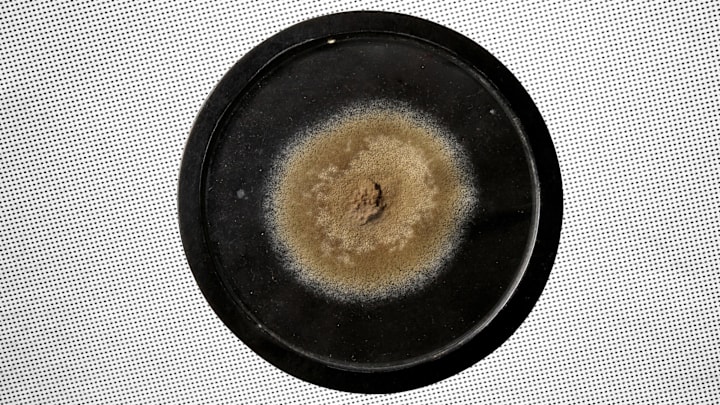The international auction house Bonhams is hoping to get $50,000 for a decades-old sample of mold.
The sandy-looking, greenish mold in question—which is preserved within a glass medallion—is a specimen of the fungus that led to the discovery of penicillin, a mid-century medical breakthrough that revolutionized doctors’ ability to fight bacterial infections. It beat back the spread of gonorrhea, much to relief of many a World War II-era sailor, and is still the first weapon of choice against strep throat, ear infections, and urinary tract infections.
As for why it’s presented as an art piece and how it ended up for sale, one needs to know about the mercurial discoverer of penicillin, Sir Alexander Fleming.
Born in 1881, Fleming was a Scottish microbiologist with reputations as a brilliant researcher of antiseptics and an infuriatingly inconsiderate lab mate. Working at St. Mary’s Hospital, London, Fleming was famous for absentmindedly leaving out Petri dishes filled with mold for weeks at a time. A discovery in one of these neglected dishes led to the discovery of lysozyme, a naturally occurring bodily enzyme that has limited uses as an anti-bacterial agent.
In 1928, Fleming was studying staphylococci, a common bacteria group. He characteristically left out a Petri dish in his lab and then went on vacation. Upon returning, he noticed that a fungus mold from the air had infiltrated the dish and destroyed some of the staphylococci cultures. After famously uttering, “That’s funny,” Fleming grew the mold—which belonged to the genus Penicillium—and tested the fungus in Petri dishes stocked with bacteria that caused ailments like scarlet fever, pneumonia, and meningitis. Penicillin, as Fleming dubbed the discovery, seemed to be quite a gladiator against bacteria.
Despite Fleming’s promotion of it, the discovery did not have much of an impact until Ernst Chain and Edward Abraham, two Oxford University microbiologists, devised ways to stabilize and mass produce penicillin. In 1945, Chain, Abraham, and Fleming shared a Nobel Prize for the development.
Fleming kept reproducing the fungal mold that led to penicillin and used eyeglass lens parts from his brother’s ophthalmology practice to preserve the specimens in glass. The same way Eric Clapton gifts his guitars, Fleming gave the mold to loved ones and to prominent individuals. According to the auction house, Pope Pius XII, Queen Elizabeth II, Winston Churchill, Franklin Roosevelt, and Marlene Dietrich were all recipients.
The one up for sale now was apparently a gift to Fleming’s niece. It was auctioned off previously, as part of a lot of Fleming/penicillin memorabilia, in 2017. That lot went for £15,000 (roughly $19,350), and was reportedly sold to a direct descendant of Fleming. If this mold medallion sells for the expected $50,000, it would be quite a return on investment.
Discover More Fascinating Science Stories:
